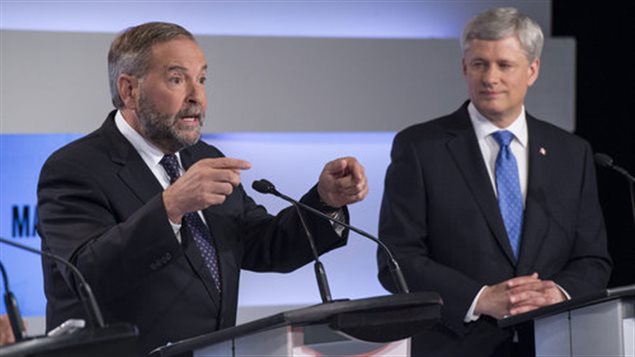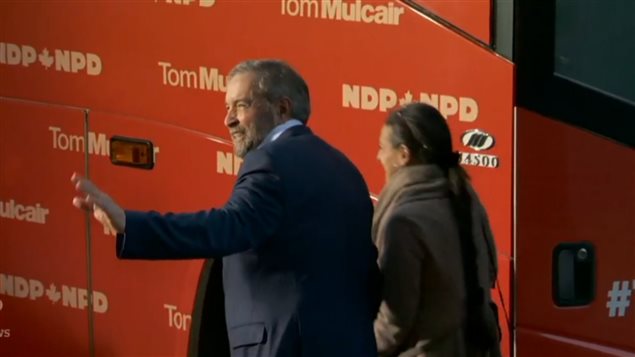At the federal level in Canada in recent decades there have been 5 political parties of note: Liberal, Conservative, New Democratic Party, Green, and Bloc Quebecois.
Of those, the Greens have been a marginal party with only two members currently in the House of Commons. The Bloc, although a federal party, supports the separation of Quebec from Canada and runs candidates only in that province. Its fortunes have waxed and waned, but because of the number of seats in Quebec, they have been a spoiler for other parties.
Throughout Canadian history, the Liberals and Conservatives have traded places in government as the leading party or the Official Opposition. However,in the 2011 election, the New Democratic Party swept the Bloc and others in Quebec in 2011, to become the Official Opposition. The then leader of the NDP, Jack Layton, died of cancer soon after, and Thomas Mulcair took over.

The party has since been hoping to build on their Quebec base and at the outset of this long campaign was also hoping for the first time in the party history and in Canadian history, to form the government.
Although all three major parties are making a number of promises, the NDP is the more socialist of the three. They have promised to raise the minimum wage to $15 an hour (although there is some confusion as this would apply only to federal employment), a national $15 a day child daycare plan, higher corporate tax, some personal tax breaks and opposition to such projects as the Keystone oil pipeline, among others.
As for the just negotiated mega-trade deal, the Trans-Pacific Partnership (TPP), Mulcair has said if the NDP forms the next government they would not present the deal to Parliament, meaning Canada would not ratify and become a part of the deal. This differs of course from the Conservative government which negotiated the deal, and the Liberals who say they would feel bound to proceed with it should they become the government.
As it was known the election would be coming, this summer before the actual election call the NDP was polling slightly ahead of the two other major parties. While the party started out well in the early part of the campaign with a variety of polls putting them tied or ahead of the Liberals and Conservatives, that position has been slipping.
Several polls in the past week and days from several different firms have all placed the NDP in third position, several points behind the other two.

Mulcair is putting on a brave face however. In an interview with the Ottaw Citizen newspaper he said, “I have no intention of getting a minority mandate,” he said. “I plan to form a majority.”
He noted that in the 2011 election, the political experts were counting the NDP out, adding they would not break through in Quebec. In that election they won 59 seats, virtually wiping out the typical Quebec leading Bloc Quebecois.
A surprise issue in the campaign this time is the wearing of the Muslim niqab during citizenship ceremonies. The Conservatives and Bloc are strongly against it, a position strongly supported in Quebec, and indeed elsewhere across Canada.
The Liberals and NDP say it shouldn’t be an issue. The NDP leader responded to the Ottawa Citizen that, “I understand fully that it causes people to feel uncomfortable. But what I am saying is that once the courts have ruled, it’s no longer a question of what people like or don’t like. You have to follow what the courts say.”
Mulcair also says he identifies with working Canadian more than the other leaders, noting that he came from a family of ten.
“I know what it’s like to struggle. When I meet families who are worried about their job in the auto sector, for me this isn’t theory. I look at those kids. I look at those parents. I know what they’re talking about.”
As for the polls, they have been known to occasionally be off the mark, as what people say to pollsters can be different than what they actually mark on the ballot in the voting booth.
As for Mulcair and the NDP chances he says, “I’m confident we can. Yeah. And I think that that’s the key word for this campaign. The one word that I would put into this discussion is the word confidence. Because, you see, we are breaking a very old habit. The old habit of telling ourselves that we have no choice.”
That will be discovered as Canadians vote on October 19th







For reasons beyond our control, and for an undetermined period of time, our comment section is now closed. However, our social networks remain open to your contributions.